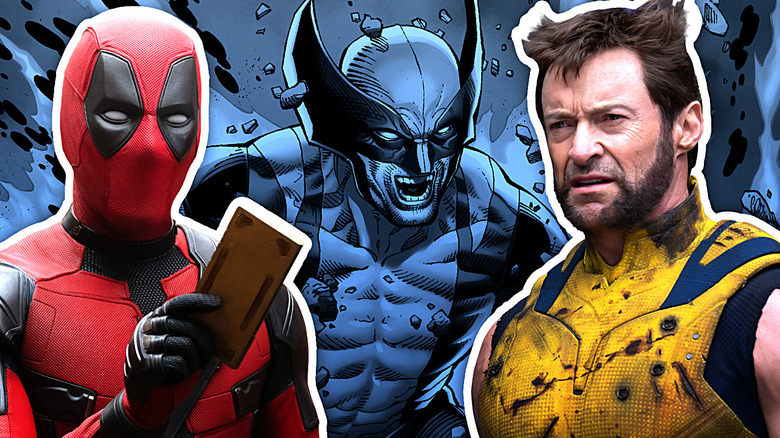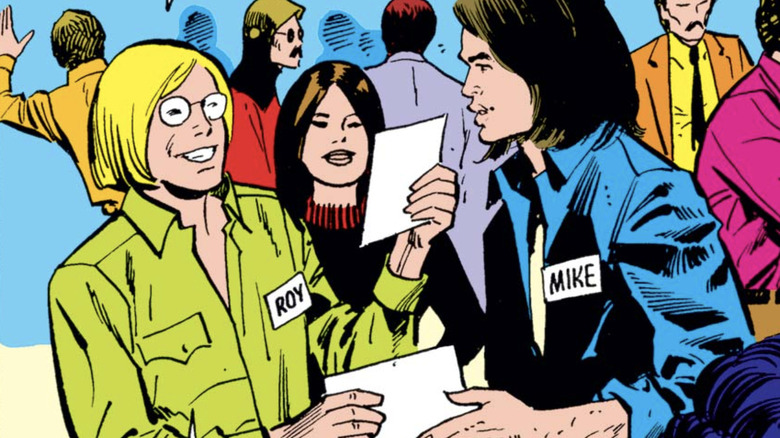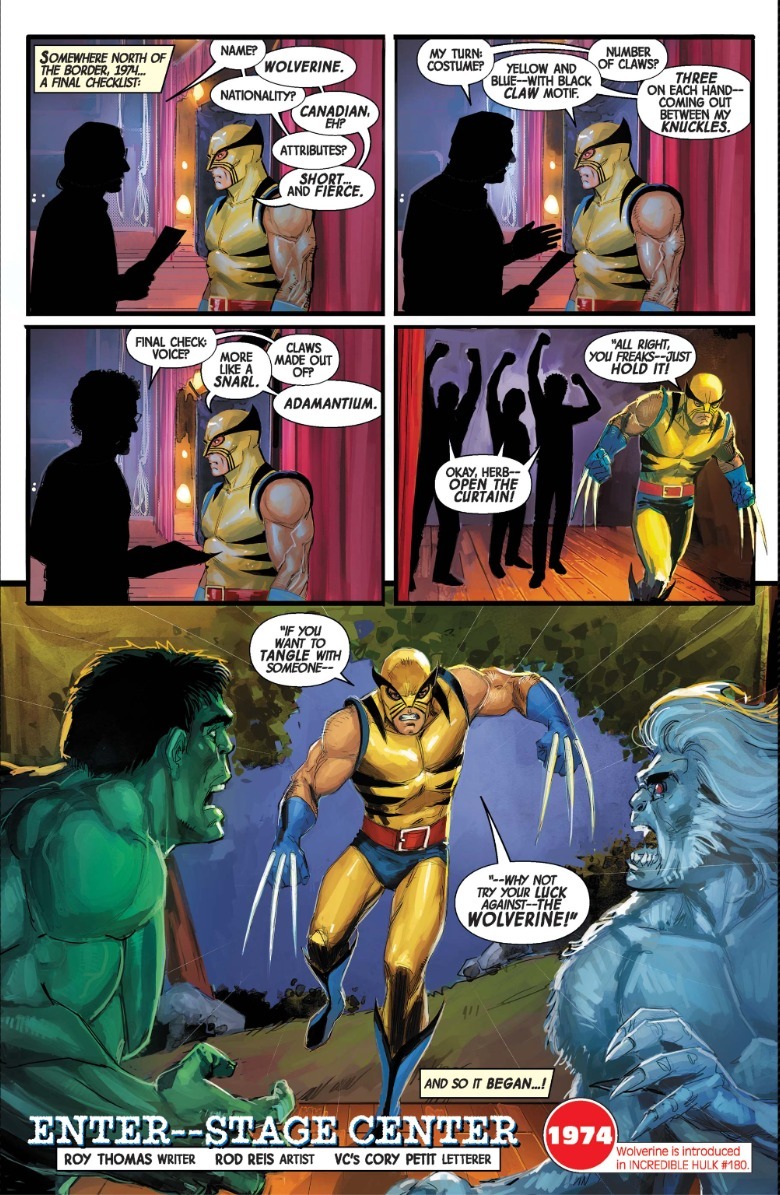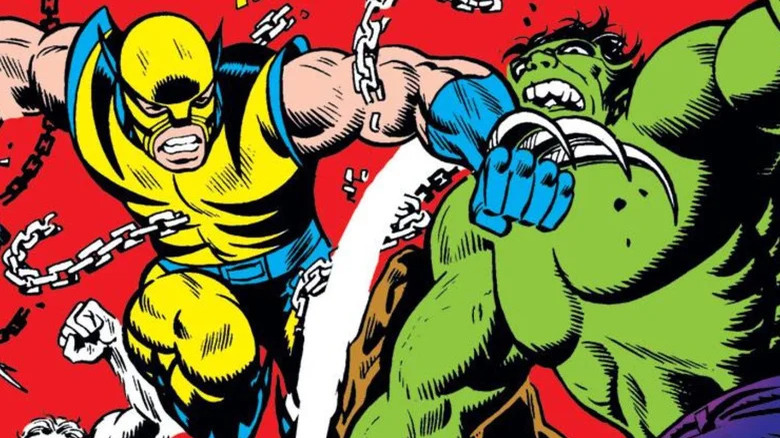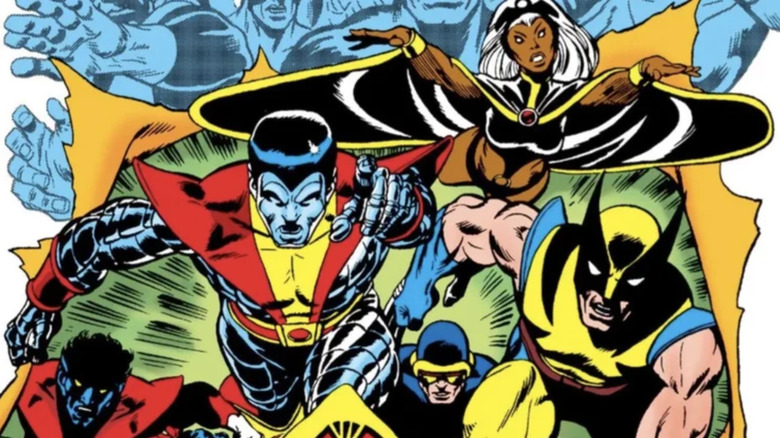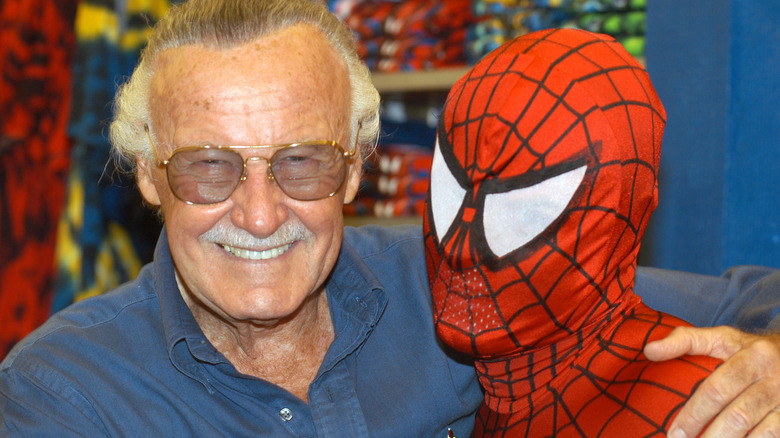Deadpool & Wolverine's Messy Logan Co-Creator Credit Controversy, Explained
2024 marks the 50th anniversary of Wolverine's creation and debut in 1974's "The Incredible Hulk" issue #180. For most of that time, it's been accepted that Wolverine was created by writer Len Wein and artist John Romita Sr. (While Herb Trimpe drew Wolverine's debut "Hulk" issues, Romita designed the character first.) However, Roy Thomas — who was Marvel Comics' editor-in-chief in 1974 — has recently (since Wein's death in 2017) been claiming he should be credited as a co-creator of Wolverine as well. Marvel has obliged him.
The credits of "Deadpool & Wolverine" included the following accreditation: "Wolverine created by Len Wein, John Romita Sr., Herb Trimpe, and Roy Thomas." Thomas subsequently wrote an op-ed in The Hollywood Reporter about finally receiving credit as a creator of Wolverine in a film. The headline quote? "My Name Should Have Come First."
Wein's widow, Christine Valada, has been a vocal opponent of Thomas staking this claim on Logan. (Thomas is the only one of Wolverine's four credited creators who is still alive.) As a copyright attorney, she has an educated understanding of the issue and not just because of her personal stake in it.
Maybe you should have done a little more research before taking Roy Thomas's side in this matter. He did not co-create Wolverine. Period. End of discussion. This is not the only character Len Wein created that he's claiming co-credit on, contrary to his assertion to you.
— Christine Valada is defending Len Wein's legacy (@mcvalada) April 2, 2024
Roy Thomas has a great deal of nerve, comparing himself to Bill Finger. https://t.co/UgPWi5r4JG
— Christine Valada is defending Len Wein's legacy (@mcvalada) April 2, 2024
As documented by BleedingCool, many of Thomas' industry peers didn't respond kindly to his THR op-ed either. Comic writer Matthew Rosenberg wrote on Twitter, "['Deadpool & Wolverine'] hasn't even been out a week and THR is already posting spoilers revealing who the villain is."
In June 2024, Zach Rabiroff wrote a massive investigative piece about Wolverine's creation, "Logan's Run," at The Comics Journal. Featuring interviews with Thomas, Valada, and more, I'd highly recommend giving it a read if you want the full, exhaustive details. Here, I'll do my best to summarize this dispute without rehashing Rabiroff's journalistic work (while fully admitting I owe it a debt) and illuminating who deserves proper credit for creating Wolverine.
What Roy Thomas claims about his part in creating Wolverine
The full quote of Thomas' that the headline alludes to is as follows: "Oh, sure, I strongly feel my name should have come first, not last, in the Wolverine grouping, since the Wolverine character was my concept on which Len and the others built ... but hey, being listed last never hurt Oliver Hardy, Lou Costello, Jerry Lewis or Paul McCartney, right? (Or Jack Kirby as in 'Simon and' and 'Lee and,' come to that.)"
He claims, "The four of us made a good team [...] with myself as editor-in-chief quite content to let Len, John and Herb handle things once I gave out general marching orders." Thomas' account, as described in Rabiroff's piece, is that he felt Marvel needed a Canadian superhero. After choosing "Wolverine" as the name, he assigned Wein to create such a character. In the past, both Wein and Thomas have said the latter was hands-off and Wein did the legwork in making Wolverine a character, not an idea.
In the THR op-ed, Thomas credits himself with Wolverine's "name, nationality, small stature, and fierce disposition" and credits Wein with "adding the 'Weapon X' complex, Wolverine being a mutant, and the notion that his Romita-devised claws were made of adamantium, a little metal I'd tossed into an earlier 'Avengers' comic."
This is consistent with a one-page story about Wolverine's creation that Thomas wrote in "Marvel Comics" #1000 in 2019 (drawn by Rod Reis). The five-panel story depicts a fourth-wall breaking take on Wolverine's creation. Across three panels, silhouettes of Thomas, Romita, and Wein quiz Wolverine on the attributes they (according to Thomas) added before his debut. The three shadows all shout, "Okay, Herb — open the curtain!" as the page ends on a recreation of Wolverine's debut panel.
Was it Roy Thomas or Len Wein who deserves more credit for Wolverine?
Earlier in 2024, Forbes writer Rob Salkowitz conducted dual interviews with Thomas and Valada. "I am only trying to finally get credit for something where the facts have been known for many years, and I'm being portrayed as a ghoul trying to rob the corpse of Len Wein for credit and money," said Thomas to Forbes.
Thomas claims that the idea and basics for Wolverine's character originated with him, while Wein only got the chance to create Wolverine on assignment. He explained to Forbes: "I could have assigned it to a different writer using my four parameters and John's design. Wolverine would have been something different because it wasn't Len writing it, but I still would have been co-creator."
He stressed to both Salkowitz and Rabiroff that this isn't about money for him, but simply getting "deserved credit." Valada also told Forbes her crusade isn't financial: "This is not about finances. This is about stolen valor. This frankly calls my husband a liar for his entire career."
In both her Forbes and Comics Journal interviews, Valada maintains that it was Wein who sat down with Romita and put together Wolverine's design. Thomas, however, claims that he assigned Romita to design Wolverine. That design is where Wolverine's character fell into place (it's when he first got his claws) and so, as Rabiroff notes in his piece, it tilts favor to Wein or Thomas depending on who you believe spearheaded the design.
Len Wein went years without compensation from Marvel
It's important to remember that Wein himself didn't always get due credit for Wolverine during his lifetime, at least not where it counts — monetarily and in adaptations. Wein was not credited on any "Wolverine" films until "Logan" in 2017, for instance. In the 2012 book "Marvel Comics: The Untold Story" by Sean Howe, Wein is quoted as such: "I have not seen a dime on any of the Marvel stuff, nor do I have a credit on ['X-Men Origins: Wolverine']. Hugh Jackman is a lovely man, and at the premiere he told the audience that he owed his career to me and had me take a bow. It was very gratifying and very nice. I would have preferred a check."
Wein's credit on "Logan" comes in the form of a thanks to comic writers/artists who played key roles in defining Wolverine and the film's other adapted characters. The full list, in order, is: Roy Thomas, Len Wein, John Romita Sr., Marjorie Liu, Craig Kyle, Chris Claremont, Marc Silvestri, John Byrne, and Dave Cockrum. At the 90th Academy Awards, when "Logan" got a Best Adapted Screenplay nomination, Wein and Romita were credited as the creators of Wolverine.
Wein's neglect, Thomas' demands for credit, and that long list of names in "Logan" speak to how crediting in comics can be difficult. It's often a collaborative medium between writers and artists, so pinning down who came up with what (especially as memories fade) can be a challenge.
The primary superhero/supervillain characters at Marvel and DC were also created by freelancers assigned to make intellectual property for publishers. That IP has been consistently published for decades and often changed along the way. Ed Brubaker and Steve Epting are the creators of the Winter Soldier, for example, but not of Bucky Barnes.
How to properly credit creators in comics
To address this, comic writer Tom King has argued that Dennis O'Neil, Neal Adams, Steve Englehart, Marshall Rogers, and Frank Miller have all earned co-creator credits on Batman. "At this point their contributions to who 'Batman' is equal and maybe surpass Kane/Finger," King said.
O'Neil/Adams, Englehart/Rogers, and Frank Miller should be credited as creators of Batman. At this point their contributions to who "Batman" is equal and maybe surpass Kane/Finger. https://t.co/CBfObRFyDA
— Tom King (@TomKingTK) November 30, 2019
For Wolverine, this framework would likely mean giving co-creator credits to Chris Claremont (who wrote most of Wolverine's defining stories and named him Logan), Dave Cockrum, John Byrne (the two artists who drew Claremont's early "X-Men" work), and Barry Windsor-Smith (who authored 1991's "Weapon X," Wolverine's origin story).
Paul Levitz, former President of DC Comics, made a similar point while speaking to Rabiroff for "Logan's Run" — "What portion of the money that you receive are you giving to [Stan Lee], to [Jack Kirby], [Roy Thomas], [Neal Adams], [Len Wein], Dave Cockrum, Chris Claremont, John Byrne, etc. All of those people added value to the X-Men in very significant fashion. And the word creator is a very powerful word."
I find King's notion well-intentioned but a slippery slope. It would probably just create more situations like Thomas' vying for credit on creating Wolverine.
There's even been evidence that Thomas, as Marvel editor-in-chief, had previously heard pitches for characters called "Wolverine" both by young fan Andy Olsen and Cockrum (who drew the "Giant-Size X-Men" #1 relaunch written by Wein). Thomas denied he remembered these when he assigned Wolverine to Wein. This is the issue with assigning authorship based on ethereal ideas, not hand to paper work.
Roy Thomas is in Stan Lee's Marvel shadow
Roy Thomas was the protégé of Stan Lee and his direct successor as Marvel's editor-in-chief. When "True Believer" by Abraham Riesman, a not particularly flattering biography of Lee, was published in 2021, Thomas leaped to his mentor's defense with a Hollywood Reporter column.
The main controversy surrounding Lee these days, in "True Believer" and elsewhere, is claims that he exaggerated his artistic importance at Marvel Comics. Critics of Lee contend that artists like Jack Kirby and Steve Ditko did most of the work in creating the Fantastic Four, Spider-Man, The Hulk, etc. while Lee (as editor) made it seem more like a 50/50 partnership. (Lee developed factory style publishing called "The Marvel Method," where he would come up with a story, the artist would turn his synopsis into a comic issue, then he would fill in the dialogue.)
Thomas, as a salaried editor, assigning Wein, a freelance writer, to make Wolverine based on some broad notes echoes Lee's partnership with Kirby and Ditko (as Rabiroff also notes). Thomas seems to have taken Lee's theory that his editorial suggestions merit him a creatorship credit. Most others generally disagree.
Valada said to Forbes: "To me, co-creator means that he either contributed to writing the story or he contributed artwork, and [Thomas] didn't do either. He made suggestions, as an editor does." (Valada said in her Comics Journal interview that Trimpe "probably should have been included" in the credits of "Logan" for this reason.)
Levitz explained to Rabiroff/Comics Journal: "It's a long-standing policy generally throughout the industry — not absolutely, but generally, and parallel in other industries — that staff editors do not get credit when the work is being done by freelance writers and artists. Editors are credited as editors. They get salaries. They get certain fringe benefits."
Despite those accepted delineations, Marvel's current owners have taken Thomas' side in the matter. I think he overreached and his THR op-ed is him being a sore winner, especially since Wein, Romita, and Trimpe aren't around anymore to contest his claims.
"Deadpool & Wolverine" is playing in theaters.
